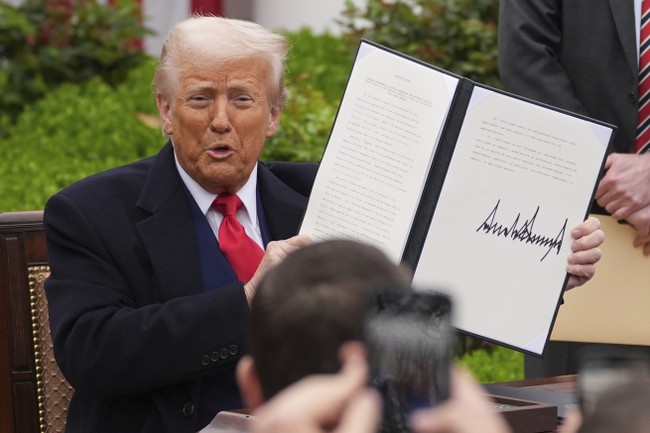
If you’re reading this article on your smartphone, then your little handheld device has probably had its passport stamped far more than you have. Some parts were from various countries in Asia, others were mined in Africa — and who knows how many underaged, malnourished orphans actually assembled it? (One of the splendid ironies of the “woke warriors” on social media is their “hashtag diplomacy” for all things liberal was built on the backs of sweatshops and child labor.)
But the real magic is in the supply lines.
The reason you can buy a flatscreen TV that’s the size of an apartment wall for just a few hundred bucks is that some brilliant dudes streamlined the sourcing, assembly, packaging, and shipping. Same goes for your car, laptop, smartwatch, and your Wi-Fi-enabled margarita mixer that plays Jimmy Buffet songs and alerts your app when you’re running low on salt.
It’s insanely complex, hi-tech, three-dimensional logistics.
When it works, it shaves costs down to the very last decimal. Which means, we get super-cheap stuff! (Confession: I like cheap stuff.)
But it also decimated America’s manufacturing base, depressed wages, and left us dependent on foreign countries for vital goods, services, foods, and medicines.
Like any economic system, there were winners and losers.
As of April 2, 2025 — a.k.a. “Liberation Day” — the old system is officially dead and buried. Globalism had a nice run; the Sam Walton family thanks you. But we’ve crossed the Rubicon now. There’s no going back.
Like Tony Soprano said, “You can’t put the [EXPLETIVE] back in the donkey.” (Which was an eerily prescient remark about the Democratic Party.)
Canadian Prime Minister Mark Carney summed up the international reaction:
The global economy is fundamentally different today than it was yesterday. The system of global trade anchored on the United States, that Canada has relied on since the end of the Second World War—a system that, while not perfect, has helped to deliver prosperity for our country for decades — is over.
Our old relationship of steadily deepening integration with the United States is over.
The eighty-year period when the United States embraced the mantle of global economic leadership—when it forged alliances rooted in trust and mutual respect, and championed the free and open exchange of good and services — is over.
While this is a tragedy, it is also the new reality.
If you’re a conservative American, then don’t fool yourself on the enormity of this dice roll: If it lands snake eyes, we’ll be a minority party for at least a decade.
Don’t kid yourself. The global economy is large enough to nuke the American economy and send it into a recession — at least in the short-term. After 80 years of unchecked globalism, we’re too intertwined; too reliant. The reality is, it’s going to take time to rebuild these supply lines.
Not days, weeks, or months. We’re talking years.
President Trump is also gambling that other world leaders will be just as motivated by economic interests as we are: They’ll cut a deal because they don’t want a recession, either.
I don’t know if they all will.
Not everyone’s primarily motivated by economics. If it plays well domestically, there could be lots of world leaders who think they can score political points — and protect their own political futures — by “standing up to Trump.”
A trade war is still a war, and wars are a heckuva lot easier to start than end. Too many moving parts; too much unpredictability.
It’ll also be the ultimate test of Donald Trump’s ability as a salesman. How tolerant will the American people be for disruption, scarcity, sacrifice, or hardship?
Trump must sell the public on his vision — that yes, the path may be difficult, but the destination will be worth it. He needs to paint a bright, dynamic image of the Promised Land we’re striving to reach.
The public’s desire for the destination will determine their tolerance for pain. The more they value the destination, the more pain they’ll be willing to tolerate.
Trump must also sell the nobility of our mission. The left has been calling him “literally Hitler” since 2015, and they’re going to dedicate barrels of ink to portraying “Liberation Day” as King Trump taking a wrecking ball to everyone’s 401(k), destroying NATO, and blowing up the old world order for [poop] and giggles. The war over the narrative of Liberation Day will decide the future of not just the Trump presidency, but the conservative movement.
Remind the public that America is a welcoming, open country, and we’d love to trade fairly and honestly with everyone else. But it’s not fair for other countries to demand unrestricted access to the U.S. market — decimating entire industries in the process — while closing their own markets to American goods.
Trump needs to get the American people pissed off! The angrier the better!
The nobility of the mission matters. In times of war, it matters more than anything else.
But the longer it goes, the harder it’ll be to sell.
One Last Thing: The Democrats are on the ropes, but make no mistake: The donkeys are still dangerous. 2025 will either go down in history as the year we finally Made America Great Again — or the year it all slipped through our fingers. We need your help to succeed! As a VIP member, you’ll receive exclusive access to all our family of sites (PJ Media, Townhall, RedState, twitchy, Hot Air, Bearing Arms): More stories, more videos, more content, more fun, more conservatism, more EVERYTHING! And if you CLICK HERE and use the promo code FIGHT you’ll receive a Trumpian 60% discount!
Thank you for your consideration!















